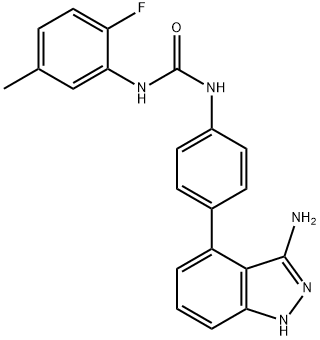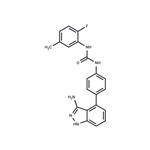Receptor tyrosine kinases (RTKs) mediate critical signaling transduction pathways important for cell survival, growth, and differentiation. Whereas aberrant tyrosine kinase signaling is correlated with the progression of various cancers, RTK inhibitors are useful as cancer therapy agents. ABT-869 is an ATP-competitive, multi-targeted RTK inhibitor that is completely effective against all members of the vascular endothelial growth factor (VEGF) and platelet derived growth factor (PDGF) receptor families (e.g., KDR, FLT1, FLT3, FLT4, CSF-1R, and KIT) demonstrating IC50 values ranging from 4-190 nM. ABT-869 shows little activity against unrelated RTKs, cytoplasmic tyrosine kinases, or Ser/Thr kinases (IC50s > 1 μM). ABT-869 inhibits proliferation in MV-4-11 and MOLM-13 cells (acute myeloid leukemia cell lines harboring RTK mutations; IC50s = 4 and 6 nM, respectively), inducing apoptosis as evidenced by an increased sub-G0/G1 phase cell population, caspase activation, and PARP cleavage. In murine xenograft models, as well as in a phase 1 clinical trial, ABT-869 demonstrated respectable efficacy in solid tumors including lung and hepatocellular carcinomas.




